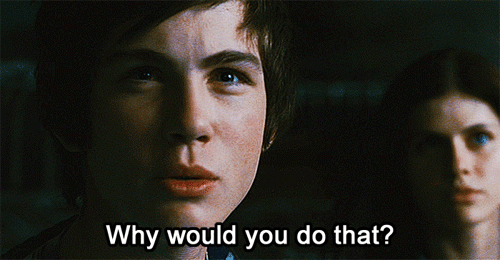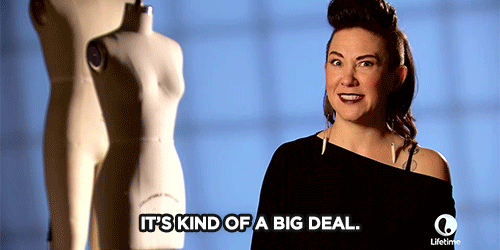- You can rent movies from the library without an adult with you.
- You can buy cigarette lighters.
- You can be the only one home when the repairman comes by.
- You can order stuff from the commercials on tv.
- You get full access to all videos on Youtube.
- You can vote.
- You can withdraw money from your bank account without your mom with you.
- You could go see an R rated movie in theaters without your parents.
- You have to double-check your facebook settings because the site no longer protects your privacy as a minor.
- You can sign forms without your parent/guardian signing it as well.
- You can get a job without a special paper saying you're allowed to work
- You can get married
- You can read M rated fanfiction on that one site that actually blocks M rated fanfictions unless you're eighteen
Additionally, within my family, when I turned eighteen I was:
- Allowed to date
- Getting prepared to move out of the house to college
- Given my first bouquet of roses (by my dad)
- Trying to figure out financial terms for a student loan
Obviously, turning eighteen is a fairly big deal in a few ways (at least in the U.S.). But the point of all this isn't to show how big of a life change turning eighteen is; it is actually to demonstrate what a big deal coming of age is.
Judaism sets its age of majority at age 12 or 13. According to wikipedia (which I don't trust, but it's fine for demonstration purposes), Canada's age of majority is nineteen. In Iran, the age of majority for girls is eight, and for boys, fourteen (again this is from wikipedia).
 |
| Seriously, Iran. Why would you give a kid that much responsibility? |
Obviously it varies greatly.
Keep in mind that "age of majority" is just the threshold of adulthood. It doesn't necessarily mean that the person can get married, drive, drink, smoke, leave school, vote, etc. Those age limits are usually independent and may not coincide with the age of adulthood.
So, does the culture in your book have a age of majority? Why is it at the age it is? What changes about how a person lives their life when they hit that age? What about religion? If you have religion in your book, does it have an age set when people become adults, like Judaism? Is this event marked by a ceremony or party?
The coming of age ceremony seems to be pretty common in dystopias nowadays; the classic, "when I turned such and such an age, I got Matched/chose my faction/had to be reaped/was given my three Gifts/etc." And I'm not complaining. (Although if authors would stop sticking to age sixteen, I'd be grateful. Please add some variety to the shelves.)
But why doesn't it seem to be in other genres? Is it only tyrannical governments that impose major life changes on people turning a certain age? No! And sometimes, as with the Judaism example, it isn't a government at all! It's just tradition, or religion.
 |
| It's only been a few years since dystopias became big and it's already cliche. Just . . . stop. |
So when you next engage in a little world building, think about when your characters come of age. Ask: why the age is set when it is? Where did that particular age come from? What changes result from that birthday? Is it celebrated? Or maybe even disliked?
Play around with the idea. Maybe it is something you can add to your culture to give it more distinction.
Have you ever used an age of majority in your writing? For what? What was involved? How was it regarded by the culture and by the individual characters? Share in the comments! I want to hear what you've done with this, my fellow internet-dwellers!


Ohhhhhh I like this. My babies start training for careers while they're seventeen and have to have one by eighteen pretty much.
ReplyDeleteBut I'd like to think over what else I could do with ages...
Yeah, I was just thinking about all the stuff that changed when I turned eighteen and was like, "ooh, I wonder what else could be done with this?" I want to fool around with it in my own stories, too.
DeleteI'm glad you enjoyed it!
I have used age as a start for something, but normally I go for a range, rather than just 16 etc. It was considered important, but it was recognised that everyone reaches that age at a different point. If that makes sense?
ReplyDeleteAge is interesting, because (for example) just because you've turned 18 doesn't mean you should be allowed to withdraw money from the bank. I tend to think these sorts of thing should be based on maturity, but thats hard to measure.
Yes, I think the same way. Maturity is certainly what truly matters.
DeleteThanks for reading!
ohhhh, I have not even thought about this for my writing! :O I'm considering a more "coming-of-age" story now (probably an MG though) but in my YA fantasy books...eh. not really. So that is totally something to consider because it is definitely, culturally, a big deal right?! I think that's pretty much the same in Australia. XD 18 is when we can do everything. Although technically we can drive alone (not as a learner) by 17. Not sure when that changes for the US. xD Otherwise...yup. 18 is the BIG age. And I think after you're 21, there's access to casinos and stuff. Not that I particularly care, lol.
ReplyDeleteThat's so sweet your dad gave you roses. XD Awwww!!
We can get our driver's licenses after six months of having our learner's permit, which (at least in the state of PA; it differs from state to state) is as soon as we turn sixteen. So, if we learned quick, we can have our licenses at sixteen and a half. But we can't buy alcohol until 21.
DeleteAnd yeah, it was really sweet! That's another thing to think about - more than just cultural things, there are also family things. :)
This is definitely something to think about! I've read a lot of fantasy novels where it's really important for the MMC to come of age, and the dad has that "You're a man now" speech, but it's important to realize that it comes in a lot of different cultures with a lot of different meanings. We don't expect our eight-year-olds to y'know, get married or whatever, but our ideas about drinking and voting are probably foreign and different to other people out there as well. So.
ReplyDeleteMmmhmm, yes, which I why I think it could be an important culture-building element. I'm no expert on culture, but I'll bet just about every culture on earth has some sort of coming-of-age traditions. Even if they don't actually come into the book, it can add a lot of depth to a culture.
DeleteThanks for reading!
Great Post. As soon as it turned towards World building I got super excited. Coming of age ceremonies are so varied across the globe and there are so many ways an author can incorporate different versions of those traditions into a novel. It doesn't even have to be coming of age. Lots cultures I've looked at have lots of different ceremonies for different stages of life. This is were humanities and antropology classes come in handy ;) If you're building a world remember that you can add more than one overarching coming of age tradition to give your story depth. Excellent read. :)
ReplyDeleteI'm glad you enjoyed it! I'll bet those classes do come in handy. I just took psych 101 and I've been using it for character development, and I've used history for inspiration. Any class, really. Hey, they've got to be useful for something interesting. :)
DeleteThanks for reading!
This comment has been removed by a blog administrator.
ReplyDeleteThanks a lot for sharing. Keep blogging
ReplyDelete